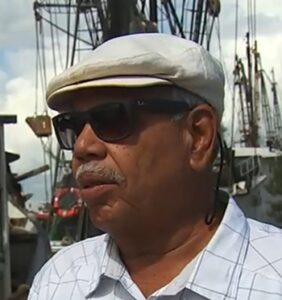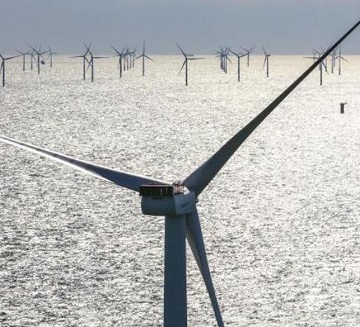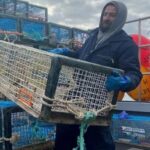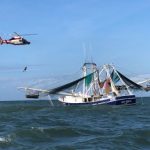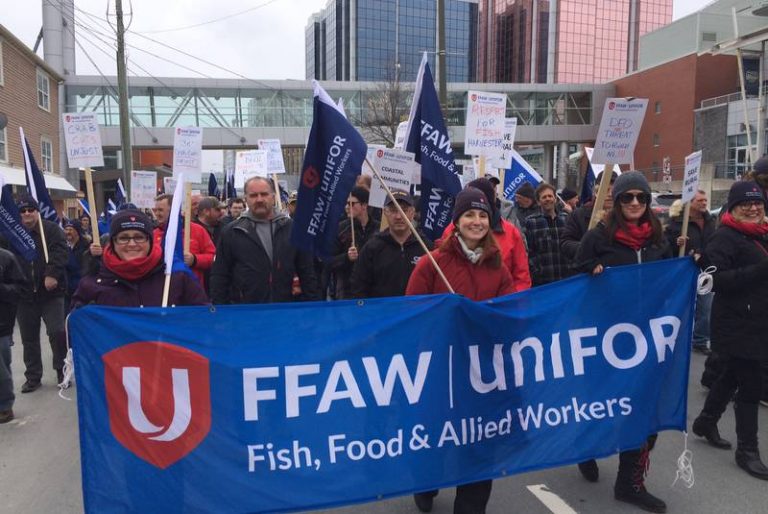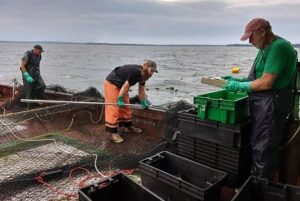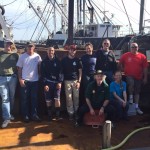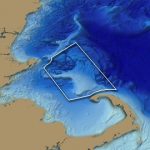Tag Archives: Texas
Commissioner Sid Miller backing Texas Rep Louderback’s proposal urging Federal Intervention to Save the Gulf Shrimp Industry
 “The Texas and U.S. shrimp industry in the Gulf of America is facing a catastrophic crisis that threatens its survival. Our industry has faced years of devastation due to the influx of inferior, farm-raised, and foreign-imported shrimp, posing an existential threat to hardworking Gulf shrimpers. I stand with Representative A.J. Louderback (District 30, Texas House) in his effort to protect our Texas Gulf shrimp industry. His bill, HCR 76, urges the federal government to limit the mass importation of foreign shrimp, safeguard Gulf Coast shrimpers from unfair competition, and ensure consumers are protected from substandard shrimp that does not meet U.S. health and safety standards. more, >>CLICK TO READ<< 09:11
“The Texas and U.S. shrimp industry in the Gulf of America is facing a catastrophic crisis that threatens its survival. Our industry has faced years of devastation due to the influx of inferior, farm-raised, and foreign-imported shrimp, posing an existential threat to hardworking Gulf shrimpers. I stand with Representative A.J. Louderback (District 30, Texas House) in his effort to protect our Texas Gulf shrimp industry. His bill, HCR 76, urges the federal government to limit the mass importation of foreign shrimp, safeguard Gulf Coast shrimpers from unfair competition, and ensure consumers are protected from substandard shrimp that does not meet U.S. health and safety standards. more, >>CLICK TO READ<< 09:11
Coast Guard detains illegal alien crewmember and captain of fishing vessel with outstanding felony warrant
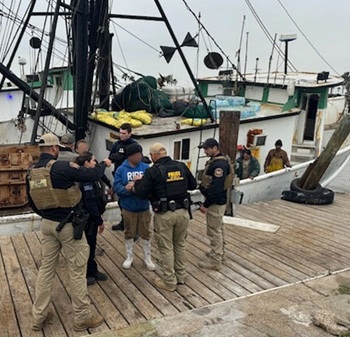 The Coast Guard detained an alien crewmember illegally present in the U.S. and the captain of a commercial fishing vessel near Port Isabel, Friday afternoon. During a commercial fishing vessel boarding, a Coast Guard Station South Padre Island boat crew identified a crewmember as a Mexican alien illegally present in the U.S. The captain of the fishing vessel, F/V Los Nietos, had an outstanding felony warrant for weapons charges. The alien was transferred to U.S. Border Patrol for processing and the vessel’s captain was booked into the South Padre Island Jail. Photos, more, >>CLICK TO READ<< 21:52
The Coast Guard detained an alien crewmember illegally present in the U.S. and the captain of a commercial fishing vessel near Port Isabel, Friday afternoon. During a commercial fishing vessel boarding, a Coast Guard Station South Padre Island boat crew identified a crewmember as a Mexican alien illegally present in the U.S. The captain of the fishing vessel, F/V Los Nietos, had an outstanding felony warrant for weapons charges. The alien was transferred to U.S. Border Patrol for processing and the vessel’s captain was booked into the South Padre Island Jail. Photos, more, >>CLICK TO READ<< 21:52
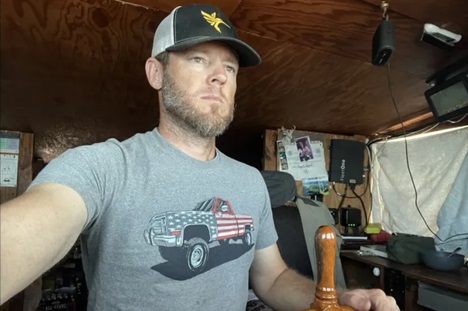
Oak Island’s Hisler family endures Gulf Coast fishing trials
I had the pleasure of visiting with George William “Bill” Hisler of Oak Island and his son, George Hisler, both involved in the fishing industry of Oak Island, Texas. Bill is the grandson of George W. Hisler and Lois Gertrude Gregory. Lois was the granddaughter of John Thomas and Jerusha Watson of Chambers County. During the early 1900s, John Watson operated a schooner between Galveston and Lake Charlotte. In 1926, at the tender age of 14, Lois married George W. Hisler, who was 36 years her senior. She moved to the Pelly oilfield, where George had lived since 1906. Together, George and Lois had one daughter, Thelma Louise, and three sons, Robert, Billy Gene, and Johnny. George died in 1946, leaving Lois a widow at the age of 34 to raise their four children. Photos, more, >>CLICK TO READ<< 06:50
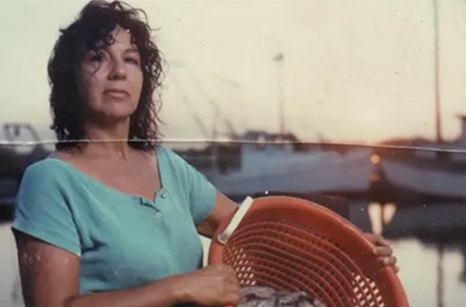
A former shrimper tries to revive Matagorda Bay and its fishing industry with $50 million pollution settlement
Few people still fish for a living on the Gulf Coast of Texas. The work is hard and pay is meager. In the hearts of rundown seaside towns, dilapidated harbors barely recall the communities that thrived here generations ago. But at the docks of Port Lavaca, one group of humble fishermen just got a staggering $20 million to bring back their timeless way of life. They’re buying out the buyer of their catch, starting the largest oyster farm in Texas and dreaming big for the first time in a long time. “We have a lot of hope,” said Jose Lozano, 46, who docks his oyster boats in Port Lavaca. “Things will get better.” It’s all thanks to one elder fisherwoman’s longshot crusade against the petrochemical behemoth across the bay, and her historic settlement in 2019. Diane Wilson, a fourth-generation shrimper from the tiny town of Seadrift, took on a $250 billion Taiwanese chemical company, Formosa Plastics Corp., and won a $50 million trust fund, the largest sum ever awarded in a civil suit under the Clean Water Act. Photos, more, >>CLICK TO READ<< 06:47
‘Never seen anything like that’ | Southeast Texas shrimpers are left unhappy after contentious meeting with wind farm developer
 A community meeting hosted by Diligence Offshore about proposed wind turbines off the Port Arthur coast quickly dissolved into frustration when the company representative abruptly left without addressing local shrimper’s concerns. Aaron Crawford with Diligence Offshore addressed the room full of concerned citizens but left the room and declined to talk to 12News less than five minutes into the meeting. “That’s all I came to tell y’all tonight. God bless y’all. Can’t answer any questions because I have a big meeting coming up on the 17th,” said Crawford. The meeting drew criticism from local shrimpers and community members. Kyle Kimball, president of the Port Arthur Area Shrimpers Association, expressed his disbelief. Video, more, >>CLICK TO READ<< 07:06
A community meeting hosted by Diligence Offshore about proposed wind turbines off the Port Arthur coast quickly dissolved into frustration when the company representative abruptly left without addressing local shrimper’s concerns. Aaron Crawford with Diligence Offshore addressed the room full of concerned citizens but left the room and declined to talk to 12News less than five minutes into the meeting. “That’s all I came to tell y’all tonight. God bless y’all. Can’t answer any questions because I have a big meeting coming up on the 17th,” said Crawford. The meeting drew criticism from local shrimpers and community members. Kyle Kimball, president of the Port Arthur Area Shrimpers Association, expressed his disbelief. Video, more, >>CLICK TO READ<< 07:06
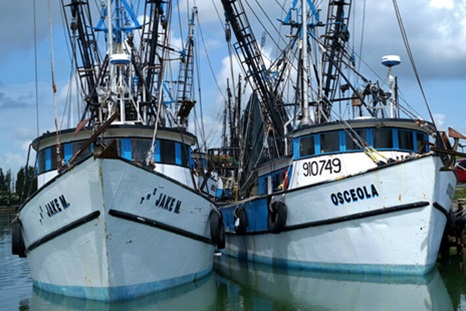
Struggling Valley shrimpers receive good news on new import measures
In an industry where bad news is the norm, shrimpers in Texas and elsewhere in the United States finally have a sliver of good news. The U.S. International Trade Commission, or ITC, on Tuesday determined that the U.S. shrimp industry is being “materially injured” by imports of frozen warm-water shrimp from Indonesia that the U.S. Department of Commerce says are being sold in this country at less than fair value, and also by shrimp imports from Ecuador, India and Vietnam that the Commerce Department says are being subsidized by the governments of those countries. As a result of the ITC’s determinations, the Commerce Department will issue “countervailing duty orders on imports of this product from Ecuador, India and Vietnam and an anti-dumping duty order on imports of this product from Indonesia,” the ITC announced Tuesday. more, >>CLICK TO READ<< 11:57
U.S. International Trade Commission votes in favor of antidumping, countervailing duties on shrimp imports
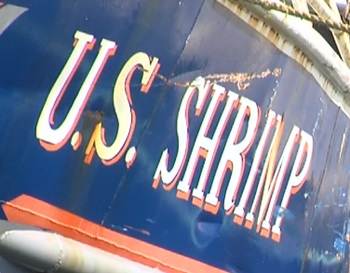 Southeast Texas fishermen are celebrating a win after the U.S. International Trade Commission voted in favor of antidumping and countervailing duties on shrimp imports from four countries. On Wednesday morning, the U.S. International Trade Commission voted in favor of antidumping and countervailing duty petitions filed by the American Shrimp Processors Association against imports of frozen warm-water shrimp from Ecuador, India, Indonesia, and Vietnam. As a result of the commission’s vote, duties ranging from 2.84% to 221.82% will be imposed on imports of shrimp from the four countries. “We are thrilled with the outcome of today’s vote,” said Trey Pearson, president of ASPA. more, >>CLICK TO READ<< 13:19
Southeast Texas fishermen are celebrating a win after the U.S. International Trade Commission voted in favor of antidumping and countervailing duties on shrimp imports from four countries. On Wednesday morning, the U.S. International Trade Commission voted in favor of antidumping and countervailing duty petitions filed by the American Shrimp Processors Association against imports of frozen warm-water shrimp from Ecuador, India, Indonesia, and Vietnam. As a result of the commission’s vote, duties ranging from 2.84% to 221.82% will be imposed on imports of shrimp from the four countries. “We are thrilled with the outcome of today’s vote,” said Trey Pearson, president of ASPA. more, >>CLICK TO READ<< 13:19
Galveston business entangled in net of fraud allegations and whistleblowers
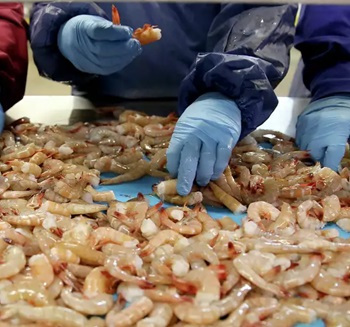 A shrimp business and former market that has been a cornerstone of Galveston for more than 45 years is in the muck, as it and its parent company are mired in a number of lawsuits alleging everything from fraud to shorting an employee. Galveston Shrimp Company was founded in 1978 by Sicilian immigrant Rosario Cassarino. For nearly 20 years, Rosario and wife Giovanna sold fish and shrimp that was brought onto the island. Their son Nello Cassarino assumed a leadership role in Galveston Shrimp Co. in 1994, and in 2011 he re-formed the company under the umbrella of Pacific Seafood, a family-owned market and business out of Portland, Ore. But now there’s a rift between Cassarino and Pacific Seafood, which owns 80 percent of Galveston Shrimp Co. According to ongoing litigation as reported by the Galveston Daily News, Cassarino is suing Pacific Seafood for $1 million, accusing the company of shorting him on revenue and self-dealing. Cassarino originally filed the lawsuit in Texas in 2023, but a judge moved the suit to Oregon. More, >>CLICK TO READ<< 10:04
A shrimp business and former market that has been a cornerstone of Galveston for more than 45 years is in the muck, as it and its parent company are mired in a number of lawsuits alleging everything from fraud to shorting an employee. Galveston Shrimp Company was founded in 1978 by Sicilian immigrant Rosario Cassarino. For nearly 20 years, Rosario and wife Giovanna sold fish and shrimp that was brought onto the island. Their son Nello Cassarino assumed a leadership role in Galveston Shrimp Co. in 1994, and in 2011 he re-formed the company under the umbrella of Pacific Seafood, a family-owned market and business out of Portland, Ore. But now there’s a rift between Cassarino and Pacific Seafood, which owns 80 percent of Galveston Shrimp Co. According to ongoing litigation as reported by the Galveston Daily News, Cassarino is suing Pacific Seafood for $1 million, accusing the company of shorting him on revenue and self-dealing. Cassarino originally filed the lawsuit in Texas in 2023, but a judge moved the suit to Oregon. More, >>CLICK TO READ<< 10:04
Big Fish Offshore Wind Producers Catch Attention Of Texas Fishermen
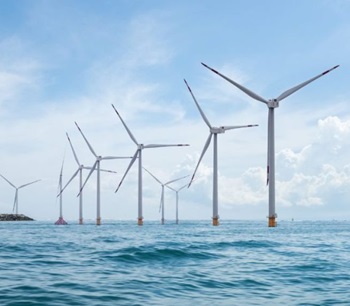 There is a fight on the open seas in Texas’ Gulf, not between sailors and pirates but between two of America’s most ambitious offshore wind producers. BlackRock-backed RWE Offshore US Gulf LLC recently asked the Bureau of Ocean Energy Management (BOEM) to pressure its competitor, Hecate Energy Gulf Wind LLC, to shell out big bucks to compensate Texas fishermen for potential damage to their fishing areas. “RWE urges BOEM to consider including an option for Hecate Energy –- and any future unsolicited proposals in the Gulf of Mexico — to commit funding for a Fisheries Compensatory Mitigation Fund,” the company recently said during a public comment period on a developing offshore wind project in south Texas. RWE also encouraged BOEM to require Hecate to develop a communication plan with fisheries and tribal governments. Texas’ fishing industry vigorously opposes RWE’s offshore wind projects, such as GOM WEA Option M near the TX-LA border. more, >>CLICK TO READ<< 16:14
There is a fight on the open seas in Texas’ Gulf, not between sailors and pirates but between two of America’s most ambitious offshore wind producers. BlackRock-backed RWE Offshore US Gulf LLC recently asked the Bureau of Ocean Energy Management (BOEM) to pressure its competitor, Hecate Energy Gulf Wind LLC, to shell out big bucks to compensate Texas fishermen for potential damage to their fishing areas. “RWE urges BOEM to consider including an option for Hecate Energy –- and any future unsolicited proposals in the Gulf of Mexico — to commit funding for a Fisheries Compensatory Mitigation Fund,” the company recently said during a public comment period on a developing offshore wind project in south Texas. RWE also encouraged BOEM to require Hecate to develop a communication plan with fisheries and tribal governments. Texas’ fishing industry vigorously opposes RWE’s offshore wind projects, such as GOM WEA Option M near the TX-LA border. more, >>CLICK TO READ<< 16:14
Save Our Shrimpers: Texas Fishermen In Danger
 Congressman Troy Nehls believes American money is being used to endanger America’s shrimping industry and he wants to put a stop to it through the Save Our Shrimpers (SOS) Act. “Our American companies are trying to compete with this shrimp coming in from Ecuador, and it’s just killing the prices,” Nehls (R-TX) noted. He said he heard from fishermen across his district and the entire Gulf region who told him they are no longer sending out shrimping trawlers because foreign competition has driven prices too low and inflation has driven expenses so high that it is no longer profitable. “Our American shrimpers are being squeezed to the point that they’re going to lose their businesses. And many of these businesses are second, third, fourth generation,” he added. more, >>CLICK TO READ<< 09:50
Congressman Troy Nehls believes American money is being used to endanger America’s shrimping industry and he wants to put a stop to it through the Save Our Shrimpers (SOS) Act. “Our American companies are trying to compete with this shrimp coming in from Ecuador, and it’s just killing the prices,” Nehls (R-TX) noted. He said he heard from fishermen across his district and the entire Gulf region who told him they are no longer sending out shrimping trawlers because foreign competition has driven prices too low and inflation has driven expenses so high that it is no longer profitable. “Our American shrimpers are being squeezed to the point that they’re going to lose their businesses. And many of these businesses are second, third, fourth generation,” he added. more, >>CLICK TO READ<< 09:50
Fishermen Taking Aim At Offshore Wind Projects Across Texas
 Fishermen are taking aim at offshore wind projects across Texas and the United States. On the same day that the Biden Administration pulled the plug on the second lease auction of a major proposed offshore wind project near the LA-TX border, the Bureau of Ocean Energy Management (BOEM) announced that it had been approached by “Hecate Energy Gulf Wind LLC (Hecate Energy) to acquire commercial wind energy lease(s) on the Outer Continental Shelf (OCS) in the Gulf of Mexico.” This potential project would transform thousands of aquatic acres into a wind farm. more, >>CLICK TO READ<< 17:04
Fishermen are taking aim at offshore wind projects across Texas and the United States. On the same day that the Biden Administration pulled the plug on the second lease auction of a major proposed offshore wind project near the LA-TX border, the Bureau of Ocean Energy Management (BOEM) announced that it had been approached by “Hecate Energy Gulf Wind LLC (Hecate Energy) to acquire commercial wind energy lease(s) on the Outer Continental Shelf (OCS) in the Gulf of Mexico.” This potential project would transform thousands of aquatic acres into a wind farm. more, >>CLICK TO READ<< 17:04
F/V Second Chance hires salvage company to help get shrimp boat off the Port Aransas sandbars
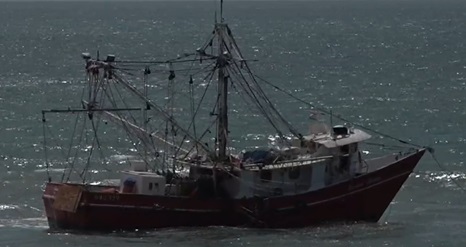 It has now been three weeks since the ‘Second Chance’ shrimp boat washed up along the shore in Port Aransas, but it looks like it’s finally moving along! The boat has moved from the second sandbar of the beach and continues to try to make its way into deeper water. The Coast Guard said the boat’s crew said a salvage company has been hired to help dislodge it, although they did not yet have information on which company was hired or when the move is scheduled to begin. Video, more, >>CLICK TO READ<< 13:32
It has now been three weeks since the ‘Second Chance’ shrimp boat washed up along the shore in Port Aransas, but it looks like it’s finally moving along! The boat has moved from the second sandbar of the beach and continues to try to make its way into deeper water. The Coast Guard said the boat’s crew said a salvage company has been hired to help dislodge it, although they did not yet have information on which company was hired or when the move is scheduled to begin. Video, more, >>CLICK TO READ<< 13:32
Shrimp boat captain grateful for community support
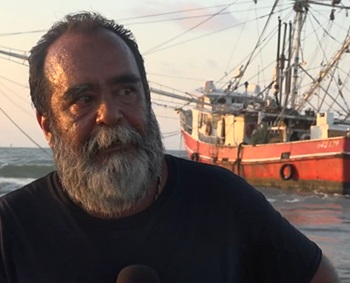 For just over a week, it has been a sight for the curious: a mysterious shrimp boat that washed up along the beach in Port Aransas. For Phillip Lara, Captain of the Second Chance boat, it has been one crashing wave after another. “Well, the whole thing has been a nightmare,” he said. “We accidentally busted our anchor line, and we were coming in to replace it, and then we had a fuel issue, which killed the boat. I had a secondary anchor, and it wasn’t big enough. We did everything we could to stop it.” The community has taken notice of his plight. A GoFundMe page has raised nearly $5,600 and early Wednesday morning, a few of the faithful gathered in prayer to ask for help of another kind. Video, more, >>CLICK TO READ<< 06:21
For just over a week, it has been a sight for the curious: a mysterious shrimp boat that washed up along the beach in Port Aransas. For Phillip Lara, Captain of the Second Chance boat, it has been one crashing wave after another. “Well, the whole thing has been a nightmare,” he said. “We accidentally busted our anchor line, and we were coming in to replace it, and then we had a fuel issue, which killed the boat. I had a secondary anchor, and it wasn’t big enough. We did everything we could to stop it.” The community has taken notice of his plight. A GoFundMe page has raised nearly $5,600 and early Wednesday morning, a few of the faithful gathered in prayer to ask for help of another kind. Video, more, >>CLICK TO READ<< 06:21
Captain John Ernest Tarasevich has passed away
 Captain John Ernest Tarasevich passed away peacefully at home on North Padre Island, Corpus Christi, Friday, July 26, 2024. John graduated with a Bachelor of Science in accounting in 1971. Instead of pursuing a career in business. John chose a different path and began working as a commercial fisherman in Pt. Judith, RI. Over his 21 colorful years on the water John made many lifelong friends, starting as a deckhand and eventually buying and captaining his own vessels, F/V Mary Cay, F/V St. Jude. His voice was recognizable to captains of fishing vessels up and down the East Coast. He also served for 8 years as secretary and treasurer for the Pt. Judith Fishermen’s Cooperative, at the time a leading economic and political force in the Northeast fisheries. more, >>CLICK TO READ<< 08:32
Captain John Ernest Tarasevich passed away peacefully at home on North Padre Island, Corpus Christi, Friday, July 26, 2024. John graduated with a Bachelor of Science in accounting in 1971. Instead of pursuing a career in business. John chose a different path and began working as a commercial fisherman in Pt. Judith, RI. Over his 21 colorful years on the water John made many lifelong friends, starting as a deckhand and eventually buying and captaining his own vessels, F/V Mary Cay, F/V St. Jude. His voice was recognizable to captains of fishing vessels up and down the East Coast. He also served for 8 years as secretary and treasurer for the Pt. Judith Fishermen’s Cooperative, at the time a leading economic and political force in the Northeast fisheries. more, >>CLICK TO READ<< 08:32
Three adults, two dogs rescued from beached shrimp boat in Port Aransas
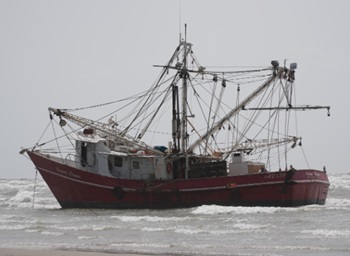 A shrimp boat, called F/V Second Chance, washed ashore just north of Horace Caldwell Pier in Port Aransas around 3 a.m. Wednesday morning. The three adults and two dogs aboard the “Second Chance” boat were rescued. No injuries were reported. According to the U.S. Coast Guard, problems with the boats anchor and mechanical issues caused it to lose power which led to it washing ashore Wednesday morning. Beachgoers on Wednesday were shocked to see this sight. The Coast Guard says that the damages to the “Second Chance” boat still need to be addressed. When the investigation is complete, a plan will be put in place to remove the vessel from the beach in Port Aransas. Video, more, >>CLICK TO READ<< 06:17
A shrimp boat, called F/V Second Chance, washed ashore just north of Horace Caldwell Pier in Port Aransas around 3 a.m. Wednesday morning. The three adults and two dogs aboard the “Second Chance” boat were rescued. No injuries were reported. According to the U.S. Coast Guard, problems with the boats anchor and mechanical issues caused it to lose power which led to it washing ashore Wednesday morning. Beachgoers on Wednesday were shocked to see this sight. The Coast Guard says that the damages to the “Second Chance” boat still need to be addressed. When the investigation is complete, a plan will be put in place to remove the vessel from the beach in Port Aransas. Video, more, >>CLICK TO READ<< 06:17
TX Fishing Industry Under Threat From BlackRock Wind Farm Project
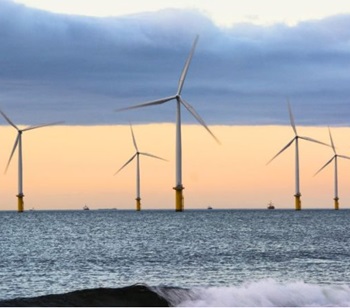 The massive destruction wrought on Massachusetts’ Vineyard Wind project has raised new questions about the safety and prudence of a similar BlackRock-backed project planned off the coasts of Louisiana and Texas near Port Arthur. Bonnie Brady of the Long Island Commercial Fisherman’s Association posted several pictures of broken and mangled offshore wind turbines from a recent storm to her X account on July 20. The images depict turbines with snapped blades hanging from their mounts. They also show large shards of metal and other debris washing ashore. Brady directed her post to every East Coast governor and the major presidential contenders, save for Vice President Kamala Harris, who had not yet announced her presidential candidacy, warning of what could happen to the fishing industry. “Stop the madness while you still can, because when the fiberglass lands on your shores you will (eventually) be out of the job. Ps we will never forget you threw US commercial fishing industries under the bus,” she wrote. more, >>CLICK TO READ<< 07:14
The massive destruction wrought on Massachusetts’ Vineyard Wind project has raised new questions about the safety and prudence of a similar BlackRock-backed project planned off the coasts of Louisiana and Texas near Port Arthur. Bonnie Brady of the Long Island Commercial Fisherman’s Association posted several pictures of broken and mangled offshore wind turbines from a recent storm to her X account on July 20. The images depict turbines with snapped blades hanging from their mounts. They also show large shards of metal and other debris washing ashore. Brady directed her post to every East Coast governor and the major presidential contenders, save for Vice President Kamala Harris, who had not yet announced her presidential candidacy, warning of what could happen to the fishing industry. “Stop the madness while you still can, because when the fiberglass lands on your shores you will (eventually) be out of the job. Ps we will never forget you threw US commercial fishing industries under the bus,” she wrote. more, >>CLICK TO READ<< 07:14
Port Isabel EDC helps keep shrimpers afloat with financial assistance
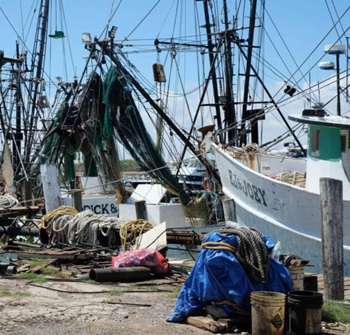 The Gulf shrimp industry is struggling to stay afloat against a flood of cheap imported shrimp, and Brownsville-Port Isabel’s shrimp industry is far from immune. It’s not a new problem, but this year the Port Isabel Economic Development Corporation opted to take action, in the form of financial assistance to help shrimp boat owners pay for fuel. Port Isabel City Manager Jared Hockema said the EDC provided six grants of $10,000 each to individual boat owners on a first come, first serve basis. To be eligible, boat owners had to be based in Port Isabel and had to have operated a boat or fleet last year, he said. The city, meanwhile, made sure there was no overlap in ownership among recipient companies, so no one got more than their share, Hockema said. more, >>CLICK TO READ<< 10:03
The Gulf shrimp industry is struggling to stay afloat against a flood of cheap imported shrimp, and Brownsville-Port Isabel’s shrimp industry is far from immune. It’s not a new problem, but this year the Port Isabel Economic Development Corporation opted to take action, in the form of financial assistance to help shrimp boat owners pay for fuel. Port Isabel City Manager Jared Hockema said the EDC provided six grants of $10,000 each to individual boat owners on a first come, first serve basis. To be eligible, boat owners had to be based in Port Isabel and had to have operated a boat or fleet last year, he said. The city, meanwhile, made sure there was no overlap in ownership among recipient companies, so no one got more than their share, Hockema said. more, >>CLICK TO READ<< 10:03
Gulf of Mexico Shrimp Fishery to Re-Open Off Texas on July 15, 2024
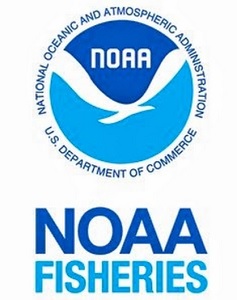 NOAA Fisheries announces federal waters from 9 to 200 nautical miles off Texas will open to shrimp trawling beginning 30 minutes after official sunset, local time, on July 15, 2024, corresponding to the time Texas opens its waters to shrimp trawling. The waters off Texas are closed to shrimp fishing annually to allow brown shrimp to reach a larger and more valuable size prior to harvest, and to prevent waste of brown shrimp that might otherwise be discarded because of their small size. The fishery closed on May 15, 2024. The re-opening date for Texas waters is based on the results of biological sampling by the Texas Parks and Wildlife Department and the assessment of maximum tidal durations. In addition, Texas regulations only allow a 60-day closure; the 60-day period expires July 15, 2024. more, >>CLICK TO READ<< 09:47
NOAA Fisheries announces federal waters from 9 to 200 nautical miles off Texas will open to shrimp trawling beginning 30 minutes after official sunset, local time, on July 15, 2024, corresponding to the time Texas opens its waters to shrimp trawling. The waters off Texas are closed to shrimp fishing annually to allow brown shrimp to reach a larger and more valuable size prior to harvest, and to prevent waste of brown shrimp that might otherwise be discarded because of their small size. The fishery closed on May 15, 2024. The re-opening date for Texas waters is based on the results of biological sampling by the Texas Parks and Wildlife Department and the assessment of maximum tidal durations. In addition, Texas regulations only allow a 60-day closure; the 60-day period expires July 15, 2024. more, >>CLICK TO READ<< 09:47
Hurricane Beryl Makes Landfall in Texas as a Category 1 Storm
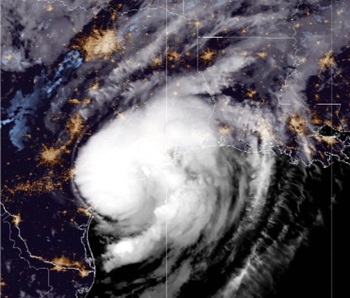 Hurricane Beryl made landfall on the central Texas coastline before dawn on Monday, bringing dangerous storm surge and whipping winds to millions of people in the state. Beryl was a Category 1 storm when it came ashore at just before 4 a.m. local time, meaning it had sustained winds of at least 74 miles per hour. The storm made landfall in Matagorda, Texas, a city between Galveston and Corpus Christi. The storm was expected to carry enough rain to cause significant flooding in the Houston area and beyond. A flood watch was in effect for a swath of the United States extending north from Texas to Illinois. more, >>CLICK TO READ<< 06:31
Hurricane Beryl made landfall on the central Texas coastline before dawn on Monday, bringing dangerous storm surge and whipping winds to millions of people in the state. Beryl was a Category 1 storm when it came ashore at just before 4 a.m. local time, meaning it had sustained winds of at least 74 miles per hour. The storm made landfall in Matagorda, Texas, a city between Galveston and Corpus Christi. The storm was expected to carry enough rain to cause significant flooding in the Houston area and beyond. A flood watch was in effect for a swath of the United States extending north from Texas to Illinois. more, >>CLICK TO READ<< 06:31
Hurricane forecasters warn Beryl will strengthen before slamming into Texas
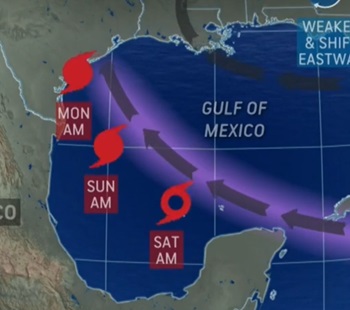 Tropical Storm Beryl marched toward the Texas coast Sunday morning as forecasters warned the storm will regain hurricane strength and slam ashore early Monday. However, Beryl’s impacts – such as strong winds, heavy rain, and rough seas – will begin in South Texas well before landfall, the National Hurricane Center warned. “Winds are first expected to reach tropical storm strength by late today (Sunday), making outdoor preparations difficult or dangerous,” the Center said. The storm made landfall on Mexico’s Yucatan Peninsula Friday morning, after it plowed through the Caribbean and Jamaica earlier this week, killing at least 11 people. At 8:00 a.m. EDT, the center of Beryl was located about 220 miles southeast of Corpus Christi in the Gulf of Mexico, traveling northwest at 12 mph. It was expected to continue moving northwest throughout the day Sunday, then north-northwest by Sunday night. Video, photos, more, >>CLICK TO READ<< 11:37
Tropical Storm Beryl marched toward the Texas coast Sunday morning as forecasters warned the storm will regain hurricane strength and slam ashore early Monday. However, Beryl’s impacts – such as strong winds, heavy rain, and rough seas – will begin in South Texas well before landfall, the National Hurricane Center warned. “Winds are first expected to reach tropical storm strength by late today (Sunday), making outdoor preparations difficult or dangerous,” the Center said. The storm made landfall on Mexico’s Yucatan Peninsula Friday morning, after it plowed through the Caribbean and Jamaica earlier this week, killing at least 11 people. At 8:00 a.m. EDT, the center of Beryl was located about 220 miles southeast of Corpus Christi in the Gulf of Mexico, traveling northwest at 12 mph. It was expected to continue moving northwest throughout the day Sunday, then north-northwest by Sunday night. Video, photos, more, >>CLICK TO READ<< 11:37
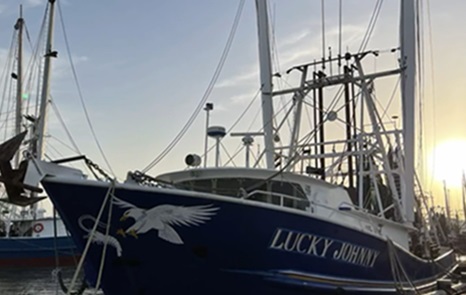
Southeast Texas shrimpers have chance to voice concerns about ‘shrimp dumping’
Southeast Texas shrimpers are fighting to protect their livelihoods amid shrimp dumping. Shrimp dumping involves the heavy import of foreign shrimp that gets “dumped” into the American market. Now, the United States International Trade Commission wants shrimpers to fill out a questionnaire and document their struggles. On Tuesday, a meeting was held at the International Seafarer Center in Port Arthur. It was filled with dozens of shrimpers eager to learn about what is happening with their fight against foreign shrimp import dumping. At Tuesday’s meeting, fishermen listened to legislative updates about a petition they submitted last year to the Department of Commerce and the International Trade Commission about shrimp dumping being investigated. Video, more, >>CLICK TO READ<< 09:28
Study reveals alarming fatality rates in the Texas shrimping industry
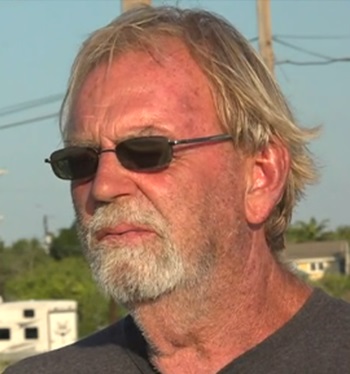 A recent study is highlighting the fatality rates in the shrimping industry, a occupation that drives an essential part of Coastal Bend dining. Dr. Shannon Guillot-Wright, associate professor of occupational health at UTHealth Houston, said that she and her team of researchers have noticed an alarming trend in our gulf waters. “We talked to many shrimpers who had things fall on their heads, their friends’ heads,” she said. Jeff Wright owns Anne’s Bait House On The Bay and said that he is no stranger to the dangers of shrimping when a fellow shrimper died on his boat dock in March. more, >>CLICK TO READ<< 10:32
A recent study is highlighting the fatality rates in the shrimping industry, a occupation that drives an essential part of Coastal Bend dining. Dr. Shannon Guillot-Wright, associate professor of occupational health at UTHealth Houston, said that she and her team of researchers have noticed an alarming trend in our gulf waters. “We talked to many shrimpers who had things fall on their heads, their friends’ heads,” she said. Jeff Wright owns Anne’s Bait House On The Bay and said that he is no stranger to the dangers of shrimping when a fellow shrimper died on his boat dock in March. more, >>CLICK TO READ<< 10:32
Celebrating National Shrimp Day on the Northern Gulf Coast
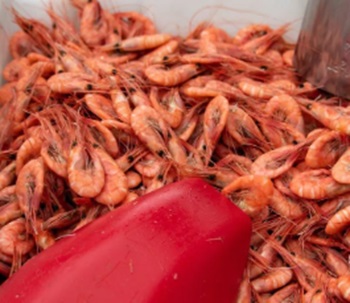 May 10th marks National Shrimp Day. For the Northern Gulf Coast, which includes the shores of Texas, Louisiana, Mississippi, Alabama, and Florida, shrimp holds a special significance as a source of food, economic growth, and cultural heritage. The warm, nutrient-rich waters of the Gulf of Mexico provide an ideal environment for shrimp to thrive, making the Northern Gulf Coast one of the most productive shrimping regions in the world. The area is home to four main commercial shrimp species: white shrimp, brown shrimp, pink shrimp, and Royal Red Shrimp. These shrimps are known for their unique flavors and textures, with Royal Red Shrimp being a highly prized delicacy. more, >>CLICK TO READ<< 09:18
May 10th marks National Shrimp Day. For the Northern Gulf Coast, which includes the shores of Texas, Louisiana, Mississippi, Alabama, and Florida, shrimp holds a special significance as a source of food, economic growth, and cultural heritage. The warm, nutrient-rich waters of the Gulf of Mexico provide an ideal environment for shrimp to thrive, making the Northern Gulf Coast one of the most productive shrimping regions in the world. The area is home to four main commercial shrimp species: white shrimp, brown shrimp, pink shrimp, and Royal Red Shrimp. These shrimps are known for their unique flavors and textures, with Royal Red Shrimp being a highly prized delicacy. more, >>CLICK TO READ<< 09:18
Federal Waters off Texas Close to Shrimping on May 15, 2024
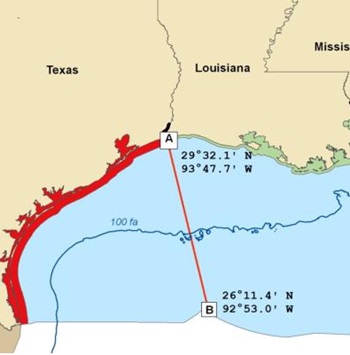 The shrimp fishery is closed annually off Texas to allow brown shrimp to reach a larger and more valuable size prior to harvest, and to prevent waste of brown shrimp that might otherwise be discarded due to their small size. The Texas closure ranges from 45 to 60 days. The closing date is based on catch rates of brown shrimp collected with seine gear by the Coastal Fisheries Division of the Texas Parks and Wildlife Department, mean length of shrimp collected in April, percent of samples containing shrimp, and periods of maximum nocturnal ebb tidal flow. Texas will re-open state waters to shrimp trawling based on sampling projections of when brown shrimp will reach a mean size of 112 mm, and when maximum duration ebb tides will occur. NOAA Fisheries will re-open federal waters off Texas when Texas re-opens its state waters. more, >>CLICK TO READ<< 11:10
The shrimp fishery is closed annually off Texas to allow brown shrimp to reach a larger and more valuable size prior to harvest, and to prevent waste of brown shrimp that might otherwise be discarded due to their small size. The Texas closure ranges from 45 to 60 days. The closing date is based on catch rates of brown shrimp collected with seine gear by the Coastal Fisheries Division of the Texas Parks and Wildlife Department, mean length of shrimp collected in April, percent of samples containing shrimp, and periods of maximum nocturnal ebb tidal flow. Texas will re-open state waters to shrimp trawling based on sampling projections of when brown shrimp will reach a mean size of 112 mm, and when maximum duration ebb tides will occur. NOAA Fisheries will re-open federal waters off Texas when Texas re-opens its state waters. more, >>CLICK TO READ<< 11:10
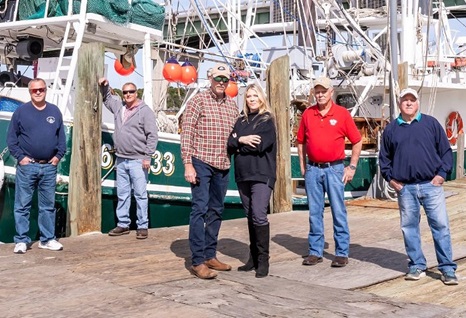
Coastal Georgia Shrimping: A new season of uncertainty, possibilities and hope
In a word, “difficult,” said Dee Kicklighter of their most recent shrimping season. Kicklighter, who has worked with Mathews for about eight years, has seen first-hand how the unpredictability of the business can be costly. “You plan for something to be one price, and then the next week you come back, and it could be potentially thousands of dollars more, depending on what you’re dealing with,” he said of fluctuating prices, including fuel. Over the years, Mathews said the ever-changing cost of fuel has taken a toll on the number of shrimpers in the industry. It’s not just Georgia shrimpers contending with the negative effects from imports. North Carolina, Texas, Louisiana, Florida and other coastal states are also feeling the friction of narrowing profit margins that threaten their way of life. Photos, more, >>click to read<< 09:15
Southeast Texas shrimpers concerned for collapse of shrimping industry
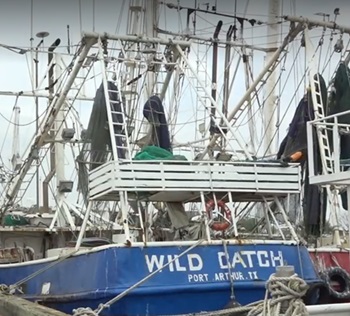 An association that represents Port Arthur’s shrimpers is concerned that imports of farm grown shrimp could collapse the local shrimping industry. In the last 18 months, southeast Texas shrimpers have docked their boats due to the now unaffordable costs of fishing. “The prices that they’re getting at the dock are more like $0.75 as opposed to $2.50 or $3 a pound which they were getting only 18 months ago,” says Father Sinclair Oubre, the treasurer for the Port Arthur Area Shrimpers Association. Video, more, >>click to read<< 08:29
An association that represents Port Arthur’s shrimpers is concerned that imports of farm grown shrimp could collapse the local shrimping industry. In the last 18 months, southeast Texas shrimpers have docked their boats due to the now unaffordable costs of fishing. “The prices that they’re getting at the dock are more like $0.75 as opposed to $2.50 or $3 a pound which they were getting only 18 months ago,” says Father Sinclair Oubre, the treasurer for the Port Arthur Area Shrimpers Association. Video, more, >>click to read<< 08:29
Shrimpers face pricing issues
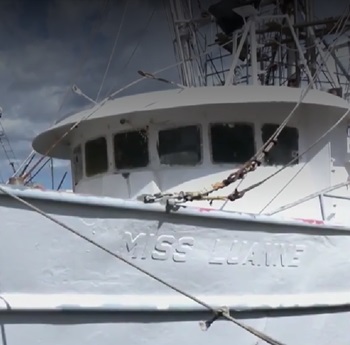 “I’ve been in the business with my parents when they were alive, straight out of high school, which is about thirty something years ago. I have never seen the price of shrimp this low,” said Jose Cuevas Jr., owner of Los Tortugos Seafood Market. Cuevas has a fleet consisting of eleven shrimp boat. He says all of his boats are now sitting idle because it’s not cost effective to go fish. He said it costs 30 to 40 thousand dollars just to fuel up one boat to go out. Other shrimpers are having the same issues with fuel costs keeping them docked. “Usually for us, around this time of year, fuel prices are a dollar fifty. Right now, they’re at close to three dollars, so double,” said Alberto Ochoa, owner of Ochoa Trawlers. Video, more, >>click to read<< 15:02
“I’ve been in the business with my parents when they were alive, straight out of high school, which is about thirty something years ago. I have never seen the price of shrimp this low,” said Jose Cuevas Jr., owner of Los Tortugos Seafood Market. Cuevas has a fleet consisting of eleven shrimp boat. He says all of his boats are now sitting idle because it’s not cost effective to go fish. He said it costs 30 to 40 thousand dollars just to fuel up one boat to go out. Other shrimpers are having the same issues with fuel costs keeping them docked. “Usually for us, around this time of year, fuel prices are a dollar fifty. Right now, they’re at close to three dollars, so double,” said Alberto Ochoa, owner of Ochoa Trawlers. Video, more, >>click to read<< 15:02






 ongressman Clay Higgins (R-LA) and Troy Nehls (R-TX) reintroduced the Save Our Shrimpers Act, which prohibits federal funds from being made available to International Financial Institutions (IFIs) that finance activities related to shrimp farming, shrimp processing, or the export of shrimp to the United States. This legislation directs an investigation within the United States Government Accountability Office (GAO) and requires annual reports to Congress that track whether IFIs’ U.S. Executive Directors are complying with Federal law USC 262(h) and opposing any assistance from international financial institutions that cause injury or harm to U.S. producers. Congressman Higgins has been a strong advocate for Louisiana’s seafood industry. Most recently, in February, he
ongressman Clay Higgins (R-LA) and Troy Nehls (R-TX) reintroduced the Save Our Shrimpers Act, which prohibits federal funds from being made available to International Financial Institutions (IFIs) that finance activities related to shrimp farming, shrimp processing, or the export of shrimp to the United States. This legislation directs an investigation within the United States Government Accountability Office (GAO) and requires annual reports to Congress that track whether IFIs’ U.S. Executive Directors are complying with Federal law USC 262(h) and opposing any assistance from international financial institutions that cause injury or harm to U.S. producers. Congressman Higgins has been a strong advocate for Louisiana’s seafood industry. Most recently, in February, he 
